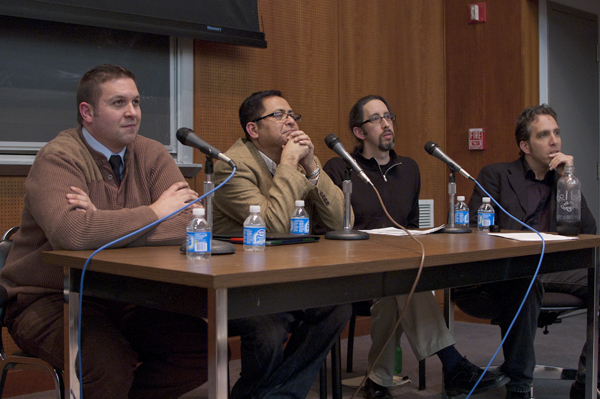
On Thursday, March 1, SUNY New Paltz professors held a panel in the Coykendall Science Building (CSB) auditorium discussing the social scientific perspectives on hydraulic fracturing.
The practice, commonly referred to as fracking, involves the injection of a fluid down a pipe and into naturally-occurring fractures in shale, releasing natural gas. Professors of geology, sociology and political science gave their views on the practice during the panel.
Geology Assistant Professor Alexander Bartholomew gave insight into the financial incentive of drilling the Marcellus Shale. He said at today’s natural gas prices, there were approximately $205 trillion worth of natural gas in the formation.
The Marcellus Shale is “at its thickest in the Hudson Valley,” and also at its peak maturity, making “Sullivan, Ulster and Delaware counties…the likeliest places for people to drill,” Bartholomew said.
The panel explained although the area that would undergo the process is too deep to affect drinking water, there are a host of other problems associated with the practice.
Since natural gas is lighter than the fluid pumped down to release it, there is no pumping needed to release the gas — it simply flows up the pipe. Bartholomew said all of the fluid (gas and water) flows out of the well without pumping because it is under pressure from the thousands of feet of rock above it. He said wells in New York will be drilled to 10,000 feet. However, this also means the gas, which is “less dense” than the water portion, can flow between the pipe and the rock around it, or between different sections of the pipe and surrounding bedrock. This is referred to as “Behind Pipe Flow,” according to Bartholomew.
Produced along with the natural gas is “waste water” which amounts to 20 to 50 percent of the fluid produced. Bartholomew said this waste is usually injected back into the ground via disposal wells.
“Problems with this are that there are natural contaminant (sic) within the shale itself, besides the fluid that is put down you have to deal with radioactive elements that are buried with the shale,” Bartholomew said.
Professor Brian Obach, chair of the sociology department, spoke about the need to develop sources of renewable energy.
“They suggest that natural gas is some kind of cleaner bridge fuel that will allow us to achieve this sustainability…nothing could be further from the truth; natural gas is a detour, not a bridge, to a sustainable economy,” he said.
Obach said although fossil fuels seem inexpensive, they are actually not when negative externalities are taken into consideration.
Obach said negative externalities are “the side effects of economic activities that negatively affect others.” One such includes the burning of fossil fuels which can lead to the increase of the Earth’s temperature.
There have been several proposals that would make the production (and purchase) of fossil fuels reflect these costs, such as a carbon tax.
Even if this does not happen, “costs will go up in the pricing of fossil fuels as these sources of fuel become more scarce and therefore will be used less,” Obach said.
Political Science Assistant Professor Daniel Lipson spoke about peak oil, saying that the International Energy Agency believes that the production of fossil fuels from known sources peaked in 2006.
“The bounty was last century, this century is the scarcity,” Lipson said.
Lipson said he sees fracking as an act of desperation. He said lawmakers are desperate to deliver on promises to achieve continued economic growth.
“We have basically sucked up half the world’s supply of fossil fuels according to many expert reports, and now we’re on the other side of the curve in the 21st century, and what has been left is the less energy-dense material that requires more expensive high-energy processing,” he said.
He also pointed out that natural gas is a key ingredient for fertilizers in industrial farming, and our current population is not sustainable without these fertilizers.
The problem, Lipson said, is that “political leaders are under tremendous pressure to deliver economic growth” and this growth is “unsustainable” and “suicidal.”
What the political leaders should be doing instead is “calling for a slow, planned contraction of their economy towards more local and resilient policies,” and a way of life more like the Amish than our current way of living.
“We need to do some serious culture change. It’s not as easy as the nice glossy images of wind turbines and solar panels saving the world and letting us still live in our big homes and drive in our nice electric cars,” Lipson said. “The sacrifices are much greater, and in many ways, we’ll probably be much happier people for it. But there might be much fewer of us on the planet when that happens.”
